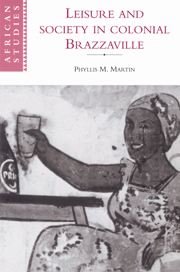Book contents
- Frontmatter
- Contents
- List of plates
- List of maps
- List of tables
- Acknowledgements
- List of abbreviations
- Introduction
- 1 An African crossroads, a frontier post and a colonial town, c. 1880–1915
- 2 Taking hold of the town, c. 1915–1960
- 3 The emergence of leisure
- 4 Football is king
- 5 About the town
- 6 Dressing well
- 7 High society
- Conclusion
- Notes
- Bibliography
- Index
- Titles in the series
Conclusion
Published online by Cambridge University Press: 09 November 2009
- Frontmatter
- Contents
- List of plates
- List of maps
- List of tables
- Acknowledgements
- List of abbreviations
- Introduction
- 1 An African crossroads, a frontier post and a colonial town, c. 1880–1915
- 2 Taking hold of the town, c. 1915–1960
- 3 The emergence of leisure
- 4 Football is king
- 5 About the town
- 6 Dressing well
- 7 High society
- Conclusion
- Notes
- Bibliography
- Index
- Titles in the series
Summary
Leisure turns out to be a very broad category of human activity, experienced by townspeople in many different ways. As a means of structuring time and space, it was imposed and taught by Europeans for a variety of reasons, whether the need to order the workforce, train Christians, or simply affirm the Tightness of the mission civilatrice. As a means of understanding time and space, concepts of work and leisure touched urban populations only partially and were most fully appropriated by the educated elite and wage-earners. On the other hand, for just about everyone, living in the town did mean experiencing in some measure new temporal schedules, for they were all around, imposed by the law, taught in schools and church, and lived by friends. Yet the tyranny of the clock never fully replaced older notions of task-oriented time, as Westerners trying to keep appointments in Brazzaville soon discover. Furthermore, the battle over work-discipline is still being waged. In 1986-7, banners on government offices and signs painted on walls at major crossroads carried such slogans as: ‘Stop absenteeism and lateness to work’ (Halte à l'absentéisme et au retard au travail), ‘Put a halt to laziness’ (Halte à la paresse); ‘Everyone has to earn their wage, their daily bread’ (Chacun doit mériter son salaire, son pain quotidien); ‘Those who don't work don't have a right to a wage’ (Qui n'a pas travaillé, n'a pas le droit de salaire); and ‘The success of the plan means devotion to work by all’ (Le succès du plan dépend au ardeur de travail de tous).
- Type
- Chapter
- Information
- Leisure and Society in Colonial Brazzaville , pp. 198 - 200Publisher: Cambridge University PressPrint publication year: 1996

